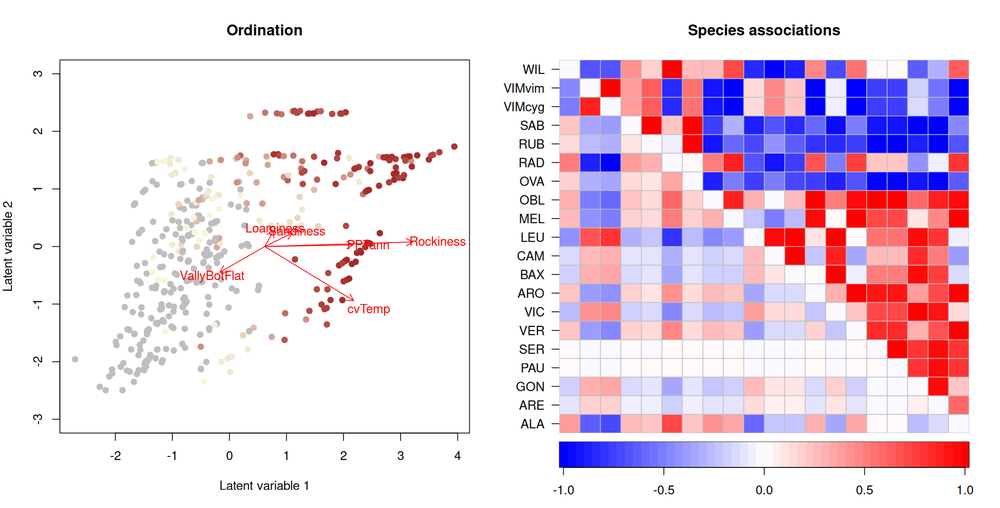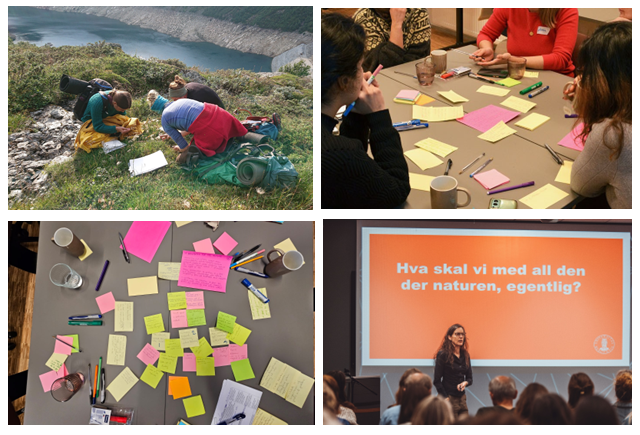Please be aware that workshop #1 is a full day workshop and cannot be combined with none of the other workshops nor Wednesday excursions.
Workshop #1
Analysing multivariate ecological data with Generalized Linear Latent Variable Models

Main organizer: Bert van der Veen, postdoctoral researcher, Department of Mathematical Sciences, NTNU, (bert.v.d.veen@ntnu.no)
Co-organizer: Audun Rugstad, PhD fellow, Department of Mathematical Sciences, NTNU
In recent years, new approaches for analysing co-occurrence patterns of species have gained in popularity. The Generalized Linear Latent Variable Modelling (GLLVM) framework unifies classical community and species distribution modelling. For binary data, the methods are better known under the popular term "Joint Species Distribution Models" (JSDM), but the framework generally represents model-based ordination methods.
Model-based ordination methods are akin to classical ordination methods, such as Principal Component Analysis (PCA), (Detrended) (Canonical) Correspondence Analysis, or even Non-Metric multidimensional scaling (NMDS). The model-based ordination framework is more flexible than classical methods, so that it is possible to retrieve better ordination, perform model diagnostics and selection, and incorporate random effects as in Generalized Linear Mixed effects Models.
In this workshop participants will learn to use state-of-the-art methods in the gllvm R-package for analysing typical community ecological data, from both JSDM and model-based ordination perspectives. Unlike other approaches (such as the HMSC package), the gllvm package fits models much more quickly, so that results even for relatively large datasets can be examined in real time. With short lectures and hands-on exercises, participants will fit models to real data. We encourage participants to bring their own data. Topics covered in the workshop will depend on interest from the participants, but can include 1) Fitting and interpreting JSDMs, 2) Fitting GLLVMs to different types of data (binary or abundance, ordinal or cover data, biomass data etc.), 3) Random effects in multi-species models, 4) Unconstrained, constrained and concurrent ordination, 5) Comparison with classical ordination methods, 6) Examination and interpretation of estimates of correlation between species (due to the environment and residual correlation), 7) Fast estimation of phylogenetic random effects models. By the end of the workshop, participants will be able to fit, interpret, and present GLLVM results for scientific publications.
Target audience:
Researcher with (ideally) their own multivariate data on an ecological community, with an interest in stepping up their multivariate analysis skills. Participants should be familiar with the R programming language, should possess some prior knowledge on ordination and/or GL(M)Ms, or a willingness to to do so on short notice.
Duration: full day, 08:30 -17:00
Workshop #2
From Studies to Solutions: The Power of Systematic Reviews and Meta-Analysis in Ecology

Main Organiser: Matt Grainger, researcher, NINA, matthew.grainger@nina.no
With the ever-growing body of scientific literature, robust evidence synthesis has become essential in ecology. However, many syntheses still lack the rigor needed for reliable conclusions. This workshop offers a tour through various types of evidence synthesis, focusing on how to conduct systematic reviews and meta-analyses with the highest standards of transparency and reproducibility. Through a mix of short lectures and hands-on practical sessions, participants will explore key tools and techniques. By the end, attendees will be equipped to synthesise ecological data more effectively, driving better-informed conservation and management decisions.
Target Audience:
The workshop is designed for ecologists, environmental scientists, and conservation practitioners at all career stages who are interested in learning systematic review and meta-analysis techniques. It will particularly benefit those involved in evidence synthesis, research synthesis, or large-scale ecological studies. The participants should bring their own laptops for hands-on practice with meta-analysis software (R).
Duration: half day, 9:00-12:00.
Workshop #3
A primer and a call for action for ecologists on IPBES, KM-GBF, and the science-policy scene

Main organizers:
Vigdis Vandvik, professor, UiB (Vigdis.Vandvik@uib.no);
Nadine Arzt, PhD fellow, UiB;
Kristine Birkeli, PhD fellow, UiB;
Ragnhild Gya, postdoctoral researcher, UiB;
Sonya Geange, researcher, UiB
With the rise of the Intergovernmental Panel on Biodiversity and Ecosystem Services (IPBES) and the adoption of the Kunming-Montreal Global Biodiversity Framework (KM-GBF), ecological and biodiversity science is increasingly taking center stage in international science-policy interface. And as the countries of the world are now making plans for how to implement the KM-GBF on a national level, there is increasing need and opportunity for science to also feed into national policies, strategies, and action plans. And as the private sector is increasingly embracing buzz-words such as sustainability and 'nature-positive', there is a need to develop ways of leveraging this enthusiasm while avoiding greenwashing. But how can the scientific community and individual scientists get involved with, contribute to, and impact these processes?
As not all ecologists are entirely up to speed on what, exactly, these international bodies and processes are, and how, exactly to most effectively interact with them, this workshop will start with a series of short presentations from different perspectives (scientists, policymakers, managers, private sector, interest organizations) to get everyone up to speed (the 'primer'). The core part of the workshop will be discussions, sharing of experiences, and brainstorming among workshop participants on effective formal and informal ways of engaging with the biodiversity and ecological science-policy interface nationally and internationally (the 'call to action'). The outcome of the workshop can be either a position paper and/or a 'primer' summarizing the knowledge shared and outcomes from discussions and brainstorming.
Duration: half day, afternoon